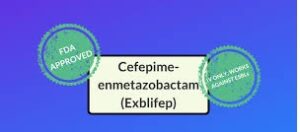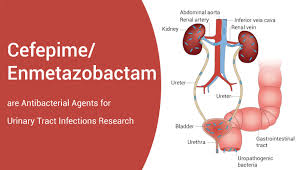Cefepime Orchid Pharma has been granted approval by the Drug Controller General of India (DCGI) for its Cefepime and Enmetazobactam antibiotic.
Cefepime Orchid Pharma, headquartered in Chennai, has secured approval from the Drugs Controller General of India (DCGI) for the production and commercialization of its newly developed Active Pharmaceutical Ingredient (API), Enmetazobactam.
Additionally, the DCGI has authorized the manufacturing and marketing of the Finished Dosage Form (FDF) of Cefepime and Enmetazobactam as a dry powder injectable. This particular formulation is designed for the treatment of complex Urinary Tract Infections (cUTI), including acute Pyelonephritis, Hospital-Acquired Pneumonia (HAP) such as Ventilator-associated pneumonia (VAP), and Bacteremia, especially when suspected or associated with complicated urinary tract infections or hospital-acquired pneumonia.
With this authorization, Orchid Pharma aims to enhance the treatment options available for severe infections in India, offering patients access to advanced and efficient therapy choices.
This novel Combination Drug presents a potent treatment alternative against various severe infections caused by resistant bacteria, addressing a crucial necessity in the fight against antimicrobial resistance.


Commenting on the approval, Manish Dhanuka, Managing Director of Orchid Pharma, expressed, “The approval of Enmetazobactam in India is particularly gratifying as an Indian enterprise; we sought to broaden access to advanced and cost-effective treatment options for Indian patients.”
The company eagerly anticipates the successful introduction and distribution of Enmetazobactam, along with its combination with Cefepime, to improve the treatment landscape for severe infections in India.
In the United States, cefepime/enmetazobactam is prescribed to treat individuals with complicated urinary tract infections, such as pyelonephritis, caused by certain susceptible microorganisms, including Escherichia coli, Klebsiella pneumoniae, Pseudomonas aeruginosa, Proteus mirabilis, and Enterobacter cloacae complex.
Within the European Union, cefepime/enmetazobactam is used for treating complicated urinary tract infections, including pyelonephritis; hospital-acquired pneumonia, including ventilator-associated pneumonia; and for treating individuals with bacteremia suspected to be associated with any of the aforementioned infections.
Cefepime/Enmetazobactam Orchid Pharma
Enterobacteriaceae resistant to third-generation cephalosporins (3GC) are classified as “critical priority” pathogens. Escherichia coli and Klebsiella pneumoniae are commonly found in healthcare-associated infections worldwide, and they contribute significantly to mortality rates in the United States and Europe. There is an urgent need for new treatment options targeting these pathogens.
The emergence of β-lactamase enzymes has played a significant role in 3GC resistance. Over the past two decades, the CTX-M family of extended-spectrum β-lactamases (ESBLs) has become the primary mechanism of 3GC resistance in K. pneumoniae and E. coli. The widespread prevalence of CTX-M-producing Enterobacteriaceae has led to increased use of carbapenems, which has further fueled the development of carbapenem resistance.
Enmetazobactam, previously known as AAI101, is a novel ESBL inhibitor with potent activity against CTX-M, TEM, SHV, and other class A β-lactamases. Unlike tazobactam, enmetazobactam acts through a distinct mechanism. Cefepime, a fourth-generation cephalosporin, is stable against AmpCs and OXA-48 and is effective against serious Gram-negative infections.
In vitro and in vivo studies have shown that the combination of enmetazobactam with cefepime exhibits activity comparable to meropenem against cefepime-nonsusceptible Enterobacteriaceae. Cefepime-enmetazobactam is intended for infections caused by ESBL-, AmpC-, and OXA-48-producing strains of Enterobacteriaceae and Pseudomonas aeruginosa. It is expected to be a valuable empirical treatment option in settings with high rates of ESBL-producing Enterobacteriaceae that aim to conserve carbapenems.
A multicenter, randomized, double-blind, noninferiority study comparing cefepime-enmetazobactam with piperacillin-tazobactam in adults with complicated urinary tract infections (cUTI), including acute pyelonephritis (AP), was initiated in 2018.
Treatment superiority of cefepime/enmetazobactam Orchid Pharma
The CHMP recommendation stemmed from findings in the phase 3 ALLIUM trial conducted across 112 sites in 19 countries. This trial compared the efficacy of cefepime/enmetazobactam with piperacillin/tazobactam in treating cUTIs or acute pyelonephritis (AP). The primary efficacy measure was a combination of clinical cure and microbiological eradication.
Participants were randomly assigned to receive either cefepime/enmetazobactam (n = 520) or piperacillin/tazobactam (n = 521) through two-hour infusions every eight hours for up to seven days (extended to 14 days for patients with positive blood cultures at baseline).
Cefepime/enmetazobactam exhibited statistically superior overall treatment success (combining clinical cure and microbiological eradication) compared to piperacillin/tazobactam in cUTI, including AP, caused by Gram-negative pathogens (79.1% vs 58.9%). Moreover, significantly better outcomes were seen in patients with infections caused by ESBL-producing pathogens (73.7% vs 51.5%).
Cefepime/enmetazobactam demonstrated a safety profile similar to piperacillin/tazobactam, with treatment-related serious adverse events reported in only 0.2% of patients compared to 0.6% in the piperacillin/tazobactam group. The European Medicines Agency highlighted common side effects such as pain and inflammation at the infusion site, diarrhea, skin rash, and headache.
Advanz Pharma noted cefepime/enmetazobactam’s promising in vitro activity against increasingly prevalent beta-lactamase mutations like OXA-48 and AmpC, for which limited therapeutic alternatives exist in Europe.


